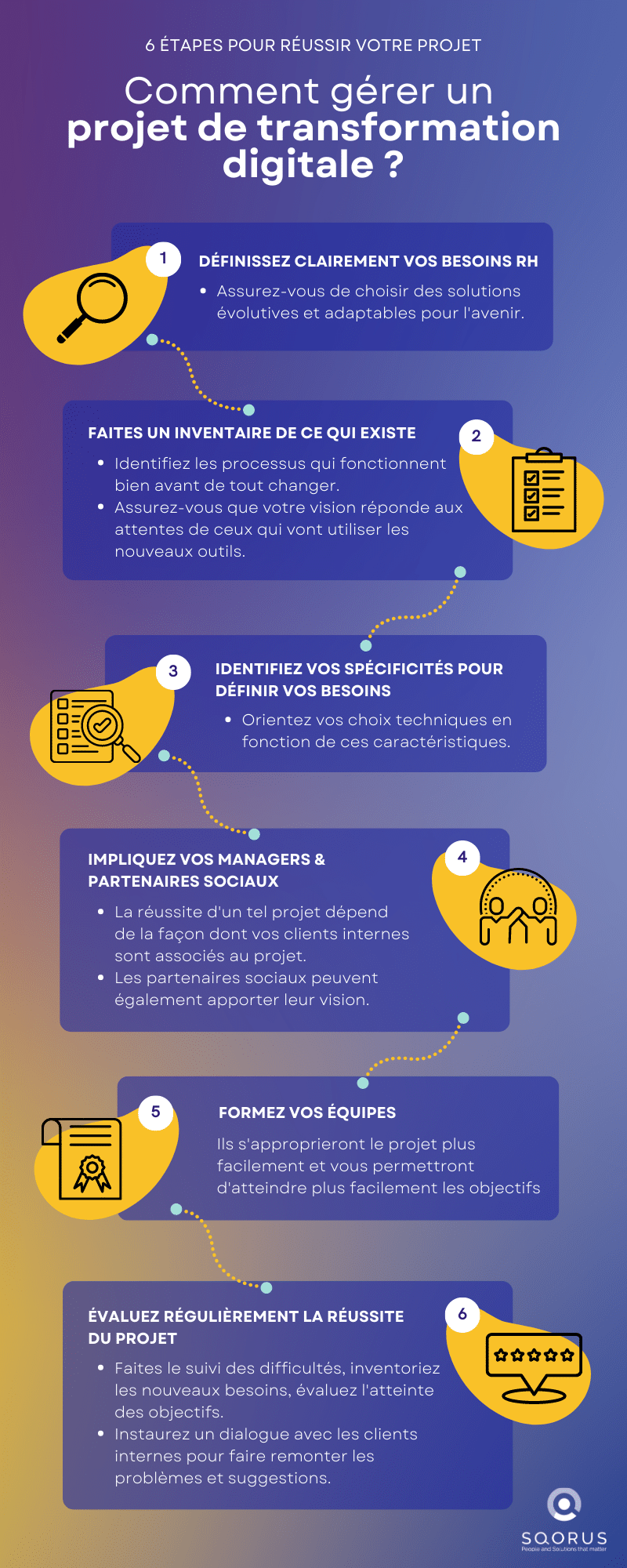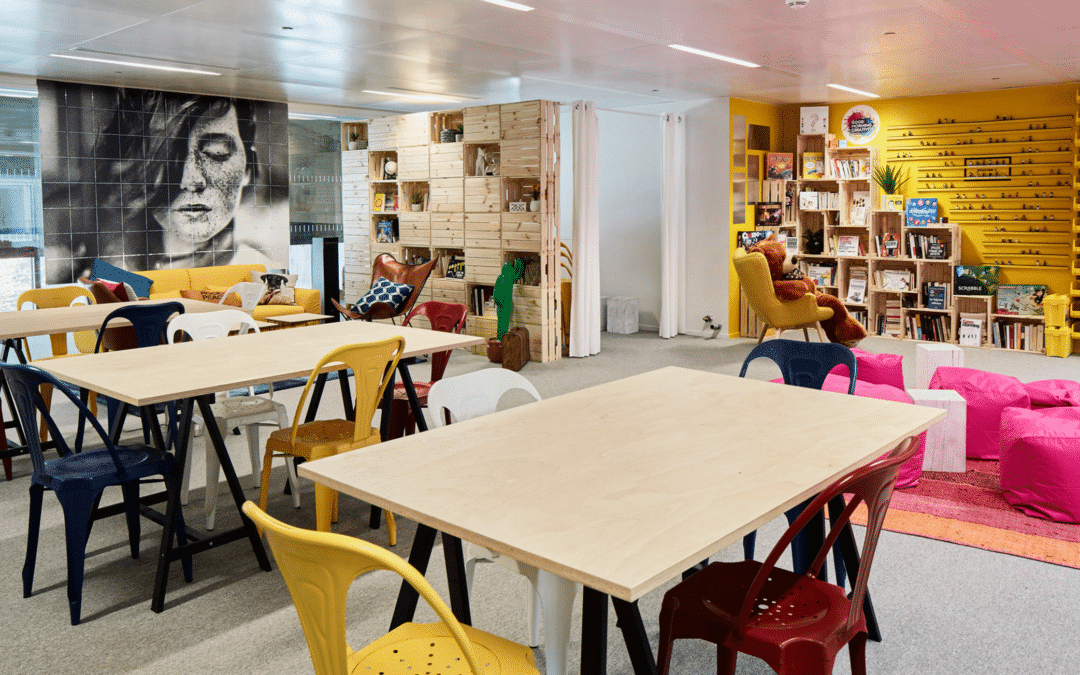What is the digitization of HR services?
When it comes to digitalizing human resources, it’s easy to focus solely on the administrative processes managed by HR, such as payroll management, time tracking, expense management and so on.
Although these processes are important to ensure the smooth running of the company, they are not in themselves factors of performance. Errors or delays can have a negative impact on employee morale and the company’s social climate.
However, to truly transform talent management, it’s important to focus on the“human capital development” aspect.
This involves asking critical questions such as:
- How to anticipate market trends and the skills required for the future?
- How do you ensure that the company has the right people for a future project?
- Are R&D teams up to date with the latest technologies, and do they receive ongoing training?
All of these issues are critical to business success and are directly related to the dynamic management of employee data to support business strategy.
Digitalization of HR to ensure the smooth running of the company
The smooth running of the company depends largely on the efficient management of human resources. The administrative side of HR needs to be organized in a seamless and fluid way, while being easy to use for employees and capable of adapting to different types of staff, such as temps, fixed-term contracts, part-timers and public and private sector employees.
That’s why it’s vital that the administrative side of HR is able to adapt to the diversity of situations and meet the challenges that arise.
However, the digital transformation of HR should not only focus on this administrative part. The real challenge of digital HR transformation lies elsewhere, and requires careful consideration of how new technologies can improve talent management and add value to the business.
Digitalization that contributes to the company’s performance and competitiveness
“A digital project can contribute significantly to the competitiveness of the company. It is important that it is strategic and effectively managed, with selected tools to improve the performance of employees and the company itself. If these tools are integrated into a well-managed HR strategy, they can offer a key competitive advantage.
Human resource management addresses the interaction between the individual needs of employees and the needs of the company as a whole. The project must integrate all these elements to form a coherent strategy. Tools need to be linked to a common database to enable measurement, analysis, prediction and informed decision-making.
The ultimate goal is to maximize the use of human capital, while offering employees a clear vision of their skills and opportunities.”
When it comes toHR tools, it is important to have an overview of the solutions available to us. They help manage the employee recruitment process, their integration, their development and their exit from the company. The Applicant Tracking System (ATS) software helps identify and attract the most suitable candidates for the company’s needs and culture. Onboarding solutions ensure optimal monitoring of the delicate integration phase, which affects talent retention. Skills management and internal mobility must meet employees’ expectations while ensuring continuity of production and company development.
Good HR software allows you to anticipate succession needs and avoid skill shortages. It offers a global view of all employees in the company or group.
Finally, a learning management platform (LMS) optimizes the implementation of the training plan and facilitates collaboration between HR, managers, employees and training organizations. It is essential to combine this with an attractive and useful training catalog.
The Digitization of HR services who benefits?
The digital transformation in HR must benefit any company concerned with its human capital management strategy.
Employees are the main beneficiaries of digitalization
In a world where the employee is increasingly seen as the customer of HR, employees see themselves as the ultimate beneficiaries of these initiatives. They should have access to various features related to their professional life, such as:
- Manage their time: leave requests, RTT, telecommuting, etc.
- Manage their personal data, claims, documents, etc.
- Request training, follow the online training process
- Apply for an internal position
- Share information
- Communicating with the HR department
- Discuss HR topics with colleagues.
The quality of HR tools and their interface play a crucial role in the employee experience. This reflects a dynamic and open HR strategy.
Digitalization at the service of managers
The digital HR strategy must take into account the needs of field managers. The goal is to give them an overview of their team, in terms of daily management (leave, absences, travel) and individual evaluation of each employee (interviews, training, mobility) as well as medium and long term planning of human resources.
Local managers play a key role in the teams. They must ensure the achievement of objectives while encouraging, motivating and supporting employees. Faced with these often conflicting demands, they need to be supported with reliable information about team members, regular check-ins, suggestions for development and ongoing training. For example, being able to watch a short video on conflict management before discussing a topic with an employee is very useful.
It is therefore crucial that managers have access to the resources and tools they need to play their role of liaison between the company’s global management strategy and its implementation in the field.
A valuable tool for managers and HR
Business leaders seek access to reliable data to make informed decisions. An enhanced digital HR can provide analytics and insights into the company’s ability to respond to opportunities, the strengths of each team, and internal competencies. This will help build a global talent and skills development strategy. The HR department will be greatly impacted by these changes, and will need to be at the forefront of the project to optimize its efficiency and implement its strategy in terms of compensation, administrative management, labor relations, recruitment, mobility, GPEC, training, career management and internal communications.
How to manage a digital HR transformation project?
You are determined to launch your ambitious project in the field of human resources, but where to start? What are the steps to follow to succeed, and what are the mistakes to avoid?
- Clearly define your HR needs: no matter where you start (administrative functions, talent management, training…), if you prefer to start with a pilot project, make sure you leave the door open to the future by choosing scalable and adaptable solutions.
- Make an inventory of what already exists: your company already uses tools to recruit, pay employees, offer training, manage leave and absences… Before changing everything, identify the processes that are working well and make sure your vision meets the expectations of those who will use the new tools.
- Identify your specific needs: company size, employee status, group structure (subsidiaries, network, international presence…), intensity and nature of training flows, turnover… Consider these characteristics to guide your technical choices, keeping in mind that your business will evolve over time.
- Involve your managers and social partners: the success of such a project depends largely on how your internal customers are involved. It must appear above all as a solution to their problems, as a tool at their service. The social partners can also contribute their vision on topics such as employee data management.
- Train your teams: to ensure that objectives are met and that employees, managers and executives take ownership of the project, it’s essential to give them the means to succeed.
- Evaluate the project’s success on a regular basis: monitor difficulties, identify new needs, assess whether objectives have been met, establish a dialogue with internal customers to bring up problems and suggestions… a dialogue that can often be facilitated by the new tools you’ve put in place!

Conclusion on the digitization of HR services
Last but not least, it’s important to work with a partner who specializes in digital transformation Council for HR departments, with a strong track record and references with an international dimension.
The SQORUS teams will put their strategic, technical and functional expertise at your service to help you make the best decisions. By following these steps and avoiding certain mistakes, you can implement a successful and effective HR digitalization project for your company. Do not hesitate to contact us to discuss this with our experts.
What tools can you use to manage your HR strategy?
Optimize your HR strategy and discover the essential management tools you need to achieve your objectives. Don't miss this opportunity to successfully manage your HR projects.
See also our feature on "HR strategy management tools".
- What are the key issues facing HR departments today?
- Organization, talent management, recruitment: priority HR projects?
- Human resources management: what HR strategies for the future?
- Best practices to manage your HR strategy in an optimal way
- The different HR management tools to carry out your HR strategy
- HRIS software: the different areas of intervention for the HR function
- How to convince your management to invest in an HRIS tool?
- Is it necessary to be accompanied in the management of an HR strategy?
- What indicators should be defined to measure the performance of an HR strategy?
- HR strategy: how to achieve effective HR reporting?
- Who should drive HR projects in the company?
- Setting up a working group for an HR project: who should be involved?
Contact
A project? A request?A question?
Contact us today and find out how we can work together to make your company’s digital future a reality.













